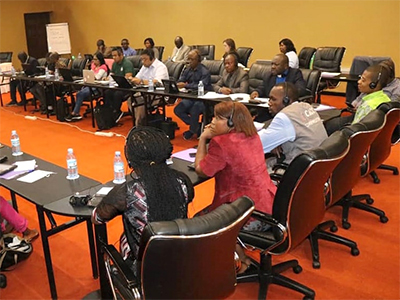Bishop Daniel Wandabula of the East Africa Episcopal Area called for oneness during the fifth annual United Methodist Radio Network meeting, noting that radio is an important tool to help unite the denomination following the divisive special General Conference.
Forty-three participants drawn from the African Central Conferences and the Philippines attended the meeting. New to the conference this year were attendees from the Central African Republic, Ethiopia, Rwanda, South Sudan and Tanzania.
"Unite the church (rather) than perpetuate divisions," said Wandabula to the group of communicators who make up the network, which launched in 2015 to support and resource existing and aspiring radio ministries.
Currently the United Methodist Radio Network includes four radio stations in Africa: Voice of Hope (Côte d'Ivoire), Radio Kairos (Angola), ELUM 98.7 (Liberia) and Radio Lokole (Congo). The Philippines operates Radio Wesleyan, which is within the Wesleyan University Philippines, the only United Methodist campus in the country.
 |
| Attendees of the United Methodist Radio Network annual meeting listen on headsets during part of the conference, April 25-27, in Kampala, Uganda. Photo by the Rev. Taurai Emmanuel Maforo. |
Addressing the deep-seated fragmentation in The United Methodist Church through radio can help bring together United Methodists of diverse persuasions, Wandabula said
"Radio is the most effective means of spreading news," he said, boasting of the more than 500 radio stations in Uganda, a number of which are community and Christian radio stations.
The East African episcopal leader called for peace, unity and tolerance in The United Methodist Church connection.
"After all this, we must remain brothers and sisters as we allow God's power to work in us."
Carlos Gouveia, United Methodist Radio Network coordinator and head of Radio Kairos of Angola, joined the unity chorus, declaring, "God speaks all languages, and before him, there is no Anglophone, Francophone, Portuguese or Swahili … and our network should reflect this."
While the bishop said it was necessary for the radio network to clear the air on the diverse issue by informing annual conferences on the processes, he argued that Africa is confronted with many more challenges that the church needs to address.
"We are excited that we are able to share with those outside the Philippines through the God is Good radio ministry," Kier Ocampo said.
Pacome Nguessan, executive secretary of the United Methodist Radio Network, implored the annual conferences with radio projects not to expect one-way support from the network, noting that results can be achieved through working together.
"We must begin to see some serious and positive movement in each annual conference in order for the network to spread its wings faster," she said.
Wandabula called on the radio network to grow into a "self-governing, self-propagating and self-financing body." He applauded the network's financing system where annual conferences contribute through subscriptions and membership fees.
excerpt from a story by Taurai Emmanuel Maforo, communicator for the Zimbabwe Episcopal Area.
One of seven apportioned giving opportunities of The United Methodist Church, the Episcopal Fund pays for bishops' salaries, office and travel expenses, and pension and health-benefit coverage. Please encourage your leaders and congregations to support the Episcopal Fund apportionment at 100 percent.





